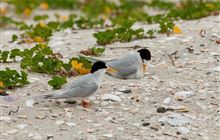First fairy tern eggs for season delights DOC rangers
Archived content: This media release was accurate on the date of publication.
Introduction
One of New Zealand’s rarest birds, the New Zealand fairy tern, has surprised DOC rangers by producing eggs in October.Date: 18 October 2018
With a total population of approximately 40 birds, the New Zealand fairy tern is critically endangered, and has teetered on the brink of extinction since the 1970s.
“Our fairy tern team has been preparing for the breeding season for a few months and we are thrilled to have eggs in nests. One of the earlier nests was lost early on, but three remain. We are hopeful the nests will be successful and the chicks will fledge by Christmas,” says DOC fairy tern team ranger Ayla Wiles.
Fairy terns nest on shell and sand banks just above high tide, which leaves them vulnerable to predators, disturbance by people, 4WD vehicles and dogs. They are also at risk from stormy weather and very high tides.
“There are three pairs of fairy tern with active nests which have one or two eggs each. The parents take turns sitting on the egg for about an hour at a time and will do this 24/7 until the chick hatches in early November”, says Ayla.
A dedicated team of five fairy tern DOC rangers have been busy since September trapping for predators near nesting sites and preventing nesting birds from being disturbed by humans.
Once widespread around the North Island and on the eastern South Island, the New Zealand fairy tern now breeds at only four nesting sites, found at Papakanui Spit, Pakiri Beach and Waipu and Mangawhai sandspits.
DOC works closely with Patuharakeke, Te Arai and Mangawhai Shorebirds Trust, the NZ Fairy Tern Charitable Trust, About Tern, Birds NZ, Armourguard, the Waipu Trapping Group and Te Uri O Hau to help protect the New Zealand fairy tern.
To help New Zealand fairy terns:
- Stay out of fenced areas and used designated walkways
- Avoid shorebird nests and chicks
- Keep dogs on leads
- Remove bait, fish and rubbish to deter predators
- Run vehicles below the tide mark
- If you are being chased, squawked at, or if a bird is on the ground pretending to be injured, you are too close to a nest
- If you find a nest do not touch it. The parent birds will be close by.
Laws to protect fairy terns and other shorebirds:
- No dogs or vehicles in Wildlife Refuges and Reserves
- Disturbance of wildlife is an offence.

